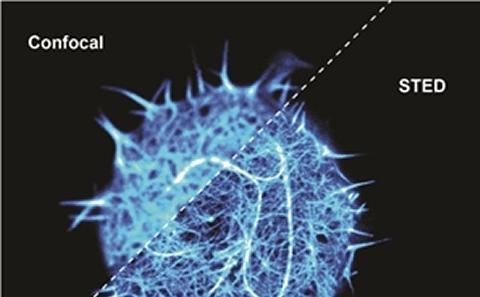Imaging Seminar Series Event

- Time:
- 16:00
- Date:
- 4 June 2015
- Venue:
- Room 2207 Building 85 Highfield Campus
For more information regarding this event, please telephone Dr Sumeet Mahajan on 023 8059 3591 or email S.Mahajan@soton.ac.uk .
Event details
Advances in super-resolution STED microscopy: Prospects for studying membrane bioactivity
Plasma membrane interactions such as the transient protein-protein or protein-lipid complexes, the formation of lipid nanodomains (often denoted “rafts”) or diffusional restrictions by the cortical cytoskeleton, are considered to play a functional part in a whole range of membrane-associated processes. However, the direct and non-invasive observation of such structures in living cells is impeded by the resolution limit of >200nm of a conventional far-field optical microscope. Here we present the use of the combination of super-resolution STED microscopy with fluorescence correlation spectroscopy (FCS) for the disclosure of complex nanoscopic dynamical processes. By performing FCS measurements in focal spots tuned to a diameter of down to 30 nm, we have obtained new details of molecular membrane dynamics, such as of transient lipid-protein interactions and of diffusional restrictions by the cortical cytoskeleton. Further insights will be given for molecular dynamics in the plasma membrane of immune cells, specifically during T-cell activation.
Speaker information
Professor Christian Eggeling,MRC Human Immunology Unit & Wolfson Imaging Centre Oxford, Weatherall Institute of Molecular Medicine, University of Oxford,Professor Eggeling holds a diploma and PhD in Physics from the University of Göttingen, where he optimized single-molecule detection. From 2000 to 2003, he was a research scientist at Evotec, Hamburg, developing advanced fluorescence microscopy techniques for high-throughput drug screening. At the end of 2003, he moved to the department of Prof. Stefan Hell (Nobel Laureat in Chemistry 2014) at the MPI of Biophysical Chemistry, Göttingen as a senior scientist, where he was involved in pushing the field of optical super-resolution microscopy, specifically the biological applicability of STED microscopy. Since the end of 2012, he has been a principal investigator in the Human Immunology Unit and the scientific director of the Wolfson Imaging Centre at the Weatherall Institute of Molecular Medicine, Oxford University, who recognized him with the title Professor of Molecular Immunology in 2014. He is applying advanced microscopy for the investigation of immune cells and cellular plasma membrane organization.